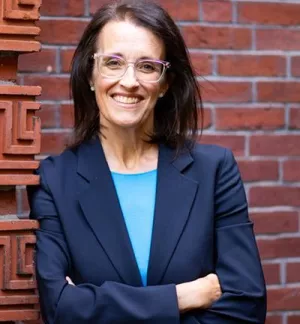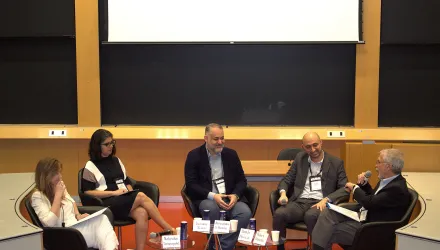Will the Obama administration's plan for vehicle emissions standards and auto efficiency affect consumer behavior? During today's OnPoint, Kelly Sims Gallagher, director of the Energy Technology Innovation Policy research group at the Harvard Kennedy School's Belfer Center, gives her take on the administration's recent auto emissions announcement and whether it will have any significant effects on the environment. Gallagher, editor of the new report, "Acting in Time on Energy Policy," explains why she believes Congress should consider a variable tax on the price of oil as part of the United States' energy policy.
Monica Trauzzi: Welcome to the show. I'm Monica Trauzzi, with me today is Kelly Sims Gallagher, director of the Energy Technology Innovation Policy research group at the Harvard Kennedy School's Belfer Center. Kelly is the editor of the new report "Acting in Time on Energy Policy." Kelly, thanks for coming on the show.
Kelly Sims Gallagher: Thanks for having me.
Monica Trauzzi: Kelly, the Obama administration recently released a plan combining vehicle emissions standards and boosted CAFE standards to address auto emissions. One of your colleagues at Harvard, Robert Stavins, argues that any gas tax would be a more successful approach to reducing auto emissions because it would actually change the way consumers drive and use energy. What's your take on the administration's move and how big of an impact this is actually going to have on the environment?
Kelly Sims Gallagher: Well, there's no question that this is a big step in terms of forcing the industry to develop fuel-efficient vehicles and to deploy them in their fleets. I think that Rob is correct in that we need to also have a complementary policy that encourages consumers to want to buy fuel-efficient cars. And we've always had this problem that if the industry makes them there's this sort of lack of demand for them, unless gas prices are increasing. And so in the last few years when oil prices rose we did see a rush to fuel-efficient cars. So that shows that consumers will respond to higher gas prices. So I too am in favor of somehow increasing the price of gasoline, but I wouldn't say instead of, I would say in addition to these CAFE standards or vehicle pollution performance standards.
Monica Trauzzi: And your new report focuses on acting on energy in time. How do we know when it's too late? I mean what's the timeline? How much time do we have to play with here before we turn around and are looking behind us?
Kelly Sims Gallagher: Yeah, I think that's a great question! You know, we tackle climate change, carbon capture and storage, oil security issues, grid reform, so there's a different set of questions on what acting in time means for each of those topics. But take the climate change issue to begin with, it appears that if we want to have a chance, a good chance of avoiding a 2 degree centigrade temperature increase which corresponds to about 3 1/2 degrees Fahrenheit, if we want a 75 percent chance of avoiding or surpassing the 2 degree centigrade temperature increase then we would have to pretty dramatically reduce our emissions. And what I argue for in this book is that we need to set our target, choose our target, and if our target is that 2 degrees, then we need to figure out what that corresponds in terms of the target emission concentration, which is probably somewhere between 350 parts per million and 450 parts per million. And then we can create an emissions budget, which is just like a financial budget, and say, well, if we want to hit that target we can only emit so much into the atmosphere. And a recent report in Nature, which you might have covered, indicated that we would have about 1000 gigatons of CO2 globally to emit between now and 2050 and we've already used 30 percent of that up in just eight years since the turn of the century. So we're really running the risk of overshooting the budget or blowing the budget if we really want to have a good chance of meeting that target. So I would say right now we're failing to act in time.
Monica Trauzzi: Right, so based on what you just laid out assess for us what's happening in the House Energy and Commerce Committee right now and the climate and energy legislation that they're trying to push through the House.
Kelly Sims Gallagher: Well, in terms of the targets, the Waxman-Markey bill is broadly consistent with that emissions budget that I said, assuming that the whole world did what Waxman and Markey are proposing to do in the United States. So the U.S. definitely cannot do this alone. When I said there's that thousand gigatons, that's a global emissions budget. So, we in the United States may over time have to be even more aggressive if we want to hit that target. I think the details of whether the cap-and-trade mechanism is going to work with all of the offsets and so forth, administrative complexity, I have concern about that, but I'm definitely supportive of the targets that are embedded in the Waxman-Markey bill.
Monica Trauzzi: We spoke about a gas tax; the report suggests that Congress should consider a variable tax on the price of oil. But what assurances can you make to consumers that they're not going to start seeing skyrocketing energy prices? I mean are you taking into account the economic impacts that some of these policies could have?
Kelly Sims Gallagher: Absolutely, I mean the proposal that Henry Lee makes about a variable oil tax or gasoline tax is really that we just set a floor, so that if prices start to fall you would sort of impose the tax at that point. And so you'd have a consistent signal sent to the consumer about the price of oil and they can then know, well, from now on it's going to be at least as much expensive. And then, if you exceed that price, you remove the tax. So you're just creating consistency about the floor. And I would argue that those revenues should be returned to consumers in the form of income tax rebates or some such mechanism.
Monica Trauzzi: So it wouldn't have huge economic impacts?
Kelly Sims Gallagher: It should not and you could do it so that you adjusted it so that more of the revenue went to lower income Americans to address the regressivity of it.
Monica Trauzzi: Transmission and grid issues are also getting a lot of attention in Congress these days and DOE recently announced it was increasing the amount of money that it would put towards smart grid grants. Is enough being done to solve the transmission and grid issues that have plagued the U.S. for decades?
Kelly Sims Gallagher: Well, there's no doubt that a huge amount of money was authorized in the American Reinvestment Recovery Act and then in this new budget that was just submitted to Congress by the president. So, I think there's plenty of money now and then the question is can we resolve all of the nonfinancial hurdles like siting of new transmission lines, getting the permitting for that. Those have proved to be really complex and difficult and I don't think we're quite there yet in terms of having resolved all of the jurisdictional issues.
Monica Trauzzi: So, overall, what are some of the key hurdles you see getting in the way of reaching the goals you talk about in the report?
Kelly Sims Gallagher: Well, I think first of all it is really hard when the benefits are longer term, so longer-term energy security, longer-term climate protection to bear those costs sooner, especially when the potential crises or a catastrophes are so far in the future. And I think it just requires a lot of leadership and we are, I think, seeing that from President Obama and in the Congress right now. And we'll see, we'll see.
Monica Trauzzi: OK, we will end it right there on that note. Thank you for coming on the show.
Kelly Sims Gallagher: Thanks so much.
Monica Trauzzi: And thanks for watching. We'll see you back here tomorrow.
The full text of this publication is available in the link below.





